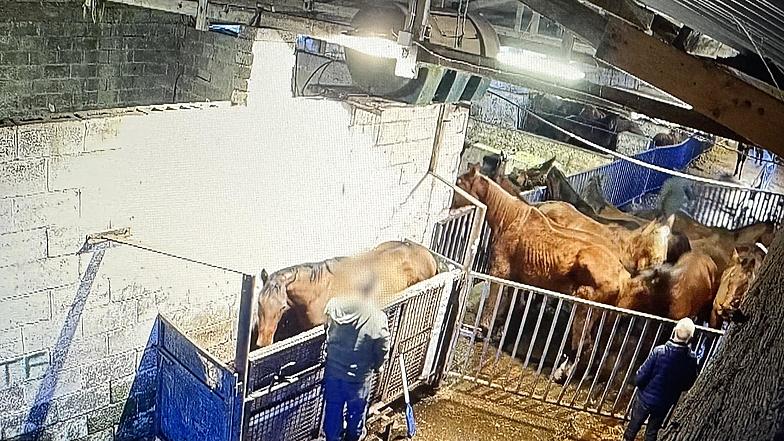Illegal horsemeat trafficking: Transparency and stricter controls needed
- politics and law
- Transparency and food safety
Hidden cameras show an Irish slaughterhouse processing thoroughbreds for the European food supply, revealing serious issues with traceability and food safety.
More than ten years after the so-called “horsemeat scandal”, an in-depth investigation by the Irish public television channel RTÉ has now revealed that in Ireland many racehorses have had their passports or electronic chips tampered with so that they can be sent to slaughter. The two-part documentary, to which foodwatch contributed, exposes a massive fraud that involves blurring the traceability of meat and allowing meat that is unfit for consumption to enter our food chain. The weakness of the current system allows criminal networks to operate in Ireland, Spain, Germany, the Netherlands, the United Kingdom and France.
Horsemeat that is not approved for human consumption ends up in our food chain – but consumers don't know where. This fraud is possible because it brings in a lot of money with little risk of being caught. Improvements to the EU food control system are more than needed. The European authorities have to find out where the tonnes of unfit horsemeat have been sold and by whom. Consumers must be informed immediately.
Across Europe, the control authorities are understaffed, and food fraud is not high on the political agenda. Criminals do not hesitate to exploit the weaknesses in the system: few controls, national databases that do not necessarily communicate and an opacity that protects themfoodwatch France
More controls, severe sanctions and transparency are needed
The scale of the problem is worrying and poses a potential health risk to consumers. In the last five years, the European Rapid Alert System for Food and Feed (RASFF), which allows Member States to exchange information on health risks, has received almost 200 alerts about problems with the labelling or passports of horses entering the European market. Each time, several countries were affected.
Since the horsemeat scandal in 2013, the consumption of horsemeat has decreased – in France, for example, from 17% to 5% today. Nevertheless, France imported around 2,500 tonnes of horsemeat in 2023, including 400 tonnes from Ireland, which corresponds to 1.6 million 250-gram steaks. Their traceability is now seriously called into question, criticised foodwatch. The RTÉ documentary shows that the traffic involves many European countries.
Although the European authorities have taken measures and issued new regulations since the 2013 scandal, these are not enough. The EU Commission has to set up an interoperable European database to provide access to standardised information in all EU countries and facilitate the traceability of horsemeat. In addition, more controls, severe sanctions and transparency are needed.
Update: foodwatch letter to the European Commission
foodwatch has demanded answers from the European Commission's Directorate-General for Health and Food Safety (DG SANTE) about the illegal horsemeat trafficking and insufficient controls within the EU's food supply chain. The letter, which was highlighted by a recent documentary, posed several crucial questions about the Commission's awareness and the measures being undertaken to prevent contaminated meat from entering the food chain.
25.06.2024
